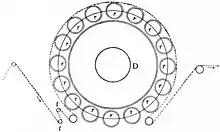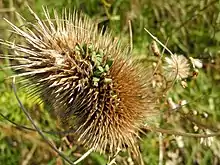
A gig-mill (gigging machine, napping machine) was type of raising machine that used teasels to produce a nap on cloth.[1][2] Examples of the results of gigging are woolen fabrics such as chinchilla, beaver cloth, and melton.[3] The process involved gradual teasing of the surface to raise the nap.[4] Spelling in some localities is "Gigg".
Gigging
Gigging was an old method of raising. As with flannelette, the fabric surface is treated with sharp teasels during Gigging to elevate the surface fibers, providing hairiness and lustrous nap. The fabric gets a soft feel. Teasels from a plant, a thistle-like species, were once used to make it. These were fixed to a cylinder. Later, teasels were replaced by metallic wires similar to those used in carding machines.[5]
Napped fabrics

"Napping", "raising" and "gigging" are synonymous terms.[6] Napping is the process of brushing for raising the nap. The raising method is used to draw out the ends of the fibers. Examples of napped fabrics include Brushed tricot,[6]: 146 and Flannelette.
Nap
Nap in textiles refers to the raised surface.[7]
Gallery
 Seedhead of Dipsacus fullonum (common teasel) showing seeds germinating while still in seedhead (vivipary)
Seedhead of Dipsacus fullonum (common teasel) showing seeds germinating while still in seedhead (vivipary) Heads of fuller and wild teasel used in finishing wool fabrics
Heads of fuller and wild teasel used in finishing wool fabrics Gigging machine
Gigging machine Manual process of raising pile in the textiles
Manual process of raising pile in the textiles Teasel used for Raising
Teasel used for Raising
See also
References
- ↑ Elihu Root Collection of United States Documents Relating to the Philippine Islands. U.S. Government Printing Office. 1906. p. 369.
- ↑ Chisholm, Hugh, ed. (1911). . Encyclopædia Britannica. Vol. 12 (11th ed.). Cambridge University Press. p. 5.
- ↑ Baker, William Henry (1901). Clothes dictionary;. The Library of Congress. Chicago, Ill., U.S.A., Cahn, Wampold & co. p. 17.
- ↑ Dyestuffs. National Aniline Division, Allied Chemical & Dye Corporation. 1946. p. 77.
- ↑ Joseph, Marjory L. (1992). Joseph's introductory textile science. Internet Archive. Fort Worth : Harcourt Brace Jovanovich College Publishers. p. 338. ISBN 978-0-03-050723-6.
- 1 2 Elsasser, Virginia Hencken (2005). Textiles : concepts and principles. Internet Archive. New York, NY : Fairchild Publications. pp. 196, 197. ISBN 978-1-56367-300-9.
- ↑ Chisholm, Hugh, ed. (1911). . Encyclopædia Britannica. Vol. 19 (11th ed.). Cambridge University Press. p. 167.
External References